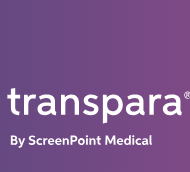
Jan. 8, 2025 — ScreenPoint Medical has acquiredf Biomediq A/S, a research-based company focused on the research, development and implementation of quantitative imaging biomarkers. After a decade of close collaboration as separate entities on image based risk assessment, this deal is expected to bring breast cancer risk assessment capabilities to ScreenPoint's Breast AI, Transpara.
The breast cancer risk analysis technology from Biomediq enables automatic, computer-based analysis of 2D and 3D mammograms for analysis of future risk of breast cancer. It is built around a Mammographic Texture Risk biomarker that recognizes tissue heterogeneity, often called mammographic texture, associated with both short- and long-term risk of breast cancer.
The potential of Transpara's Detection and Density tools combined with Biomediq's texture model was highlighted in a 2023 publication, "Assessing Breast Cancer Risk by Combining AI for Lesion Detection and Mammographic Texture." In this publication, Lauritzen, et al demonstrated that the combination of Transpara-based lesion detection, volumetric density assessment, and a quantitative texture analysis combined to deliver improved risk prediction. In addition, further imaging offered for women with the highest Transpara risk could have doubled the early detection of cancer by finding interval cancer before subsequent visits relative to traditional screening. First author of this paper, Andreas D. Lauritzen, PhD, will join the ScreenPoint team to accelerate the development of Transpara's risk capabilities.
Transpara provides radiologists with a "second pair" of eyes to help detect cancers earlier and reduce recall rates. ScreenPoint recently introduced Transpara 2.1, an updated algorithm based on additional training and insights gathered from luminary users around the world. Transpara 2.1 is compatible with options for automated breast density assessment (BIRADS and volumetric) and a robust option for temporal comparison. Allowing suspicious areas on a current study to be analyzed against up to 3 priors over 6 years, the unmatched temporal comparison capability is the first of its kind in the market. Transpara Detection (2.1) as well as the options of Temporal Comparison and Density are CE marked and FDA cleared.
"Risk-stratified screening has long been proposed to optimize screening for patients and better use resources," said Professor Nico Karssemeijer, co-founder and Chief Scientific Officer of ScreenPoint Medical. "We are excited to add the Biomediq risk analysis technology to enhance the capabilities of Transpara to improve performance for mammography-based breast cancer risk assessment. This is a game-changing step in providing accurate and consistent breast cancer detection and care for all women."
According to co-founder of Biomediq Professor Mads Nielsen, "our long time collaboration and deep relationship with the ScreenPoint team have been grounded in our shared vision for better screening for women. Joining our technologies to support radiology workflow and support care for women is an exciting fruit of this deep and complementary collaboration." Prof. Nielsen will remain an advisor to the expanded ScreenPoint team.
With 35+ peer-reviewed publications, Transpara is the only breast AI algorithm evaluated in large-scale real-world screening populations multiple times (including UCLA, Capital Region of Denmark, Lund University in Sweden, Norwegian Cancer Registry, Reina Sofia Hospital Cordoba). Research shows that up to 45% of interval cancers can be found earlier using Transpara, while helping to reduce workload and optimize workflow.
For additional information, please visit https://screenpoint-medical.com.


 February 18, 2026
February 18, 2026 









